Illustrative Mathematics
Shake and Spill
Entertaining as well as educational, this math activity about decomposing numbers is bound to capture the engagement of young learners. Given a cup and five two-color counters, young mathematicians simply shake and spill the cup,...
Illustrative Mathematics
Christina's Candies
Help Christina figure out how many chocolate and lemon candies she has with a lesson on decomposing numbers. When presenting this context to the class, the teacher chooses the total number of candies and the number that are chocolate,...
Illustrative Mathematics
What’s Missing?
Now you see them, now you don't! This fun peek-a-boo activity engages young mathematicians in developing their ability to compose and decompose numbers. After being presented with a series of counters, children close their eyes while the...
Illustrative Mathematics
Three Composing/Decomposing Problems
Practice composing and decomposing numbers in base-ten using three word problems. Each problem presents a different scenario requiring learners to explain their thinking, find the number of ones, and find out different ways to make a...
Illustrative Mathematics
Pick Two
Learning to break apart numbers into smaller pairs is a critical step young mathematicians take as they develop their number sense. To practice this skill, children are provided with sets of three numbers and are asked to pick the two...
Illustrative Mathematics
Make 9
Learning how numbers are put together as parts and wholes is a big step in building the foundational number sense of young mathematicians. Here, children are given a number less than 10 and are asked to find as many pairs of numbers as...
K20 LEARN
Decomposers—Fraction Style: Fractions
"What are fractions composed of?" is the essential question of a lesson designed to enhance understanding and strengthen the foundation of adding fractions. Mathematicians start by discussing what makes an equation true or false,...
EngageNY
Grade 5 Math Module 1, Topic D, Lesson 9
Introduces addition of decimals by using unit notation to represent the problem. Pupils use a place value chart to decompose the numbers and then add before connecting to the standard algorithm.
Noyce Foundation
Apple Farm Field Trip
Monitor the growth of young mathematicians with a comprehensive addition and subtraction assessment. Using the context of a class field trip to an apple orchard, this series of four story problems allows children to demonstrate their...
EngageNY
Fraction Equivalence, Ordering, and Operations
Need a unit to teach fractions to fourth graders? Look no further than this well-developed and thorough set of lessons that takes teachers through all steps of planning, implementing, and assessing their lessons. Divided into eight...
Illustrative Mathematics
Boys and Girls, Variation 2
How many ways can you make the number 9? Use a task that has pupils thinking about the many different ways a classroom of nine can be made up of boys and girls.
Illustrative Mathematics
Making 22 Seventeenths in Different Ways
There is more than one way to determine a sum. Scholars demonstrate their understanding of the decomposition of fractions similar to the decomposition of whole numbers. The short task requires pupils to determine which sums of fractions...
New Mexico State University
Gate
Build numbers with place value to save the day. Pupils use the keyboard to control the digits in the hundredths through hundreds place to create target numbers to destroy shadows. As participants build the numbers, a number line shows...
Illustrative Mathematics
Overlapping Rectangle
Challenge young mathematicians' ability to compose and decompose shapes with this fun geometry puzzle. The goal is simple, locate all of the rectangles shown in a picture of three overlapping rectangles. Perform this activity as a whole...
Illustrative Mathematics
Making 124
How many ways can you make the number 124 using only tens and ones? Use a task that prompts young mathematicians to make 124 in as many ways as possible.
Arcademics
Hungry Puppies
It all comes down to the treats. Individuals compete to find decimals' addends to arrive at a given sum. Pupils click on two dog treats with values that add to the target number. Each round contains the same sum and lasts a minute, and...
National Security Agency
Fraction Fever
This unit on fractions allows for upper-aged elementary learners to explore ways to find the greatest common factor and least common multiple of two numbers. Ultimately, young mathematicians will be able to identify equivalent fractions,...
EngageNY
Perimeter and Area of Triangles in the Cartesian Plane
Pupils figure out how to be resourceful when tasked with finding the area of a triangle knowing nothing but its endpoints. Beginning by exploring and decomposing a triangle, learners find the perimeter and area of a triangle. They...
EngageNY
One-Step Problems in the Real World
Mirror, mirror on the wall, which is the fairest resource of them all? Individuals write and solve one-step equations for problems about angle measurement, including those involving mirrors. Both mathematical and real-world problems are...
Mathematics Vision Project
Module 6: Trigonometric Functions
Create trigonometric functions from circles. The first lesson of the module begins by finding coordinates along a circular path created by a Ferris Wheel. As the lessons progress, pupils graph trigonometric functions and relate them to...
West Contra Costa Unified School District
Simplifying Fractions
Encourage family participation at home with a reference tool designed to support learners' practice of simplifying fractions. Two pages offer detailed descriptions and labeled examples.
Study Pad
Splash Learn: Decompose Numbers (11 to 19) Into a Ten and a Few Ones
[Free Registration/Login Required] Using ten frames and number sentences, students will practice decomposing numbers into tens and ones.
Student Achievement Partners
Illustrative Mathematics: Addition and Subtraction Fluency Set of Tasks [Pdf]
Students explore the relationship between addition and subtraction and develop an understanding of decomposing numbers in different ways in this first-grade lesson plan.
K-5 Math Teaching Resources
K 5 Math Teaching Resources: Decompose a Factor [Pdf]
Students will learn how to determine the product by decomposing the factors.
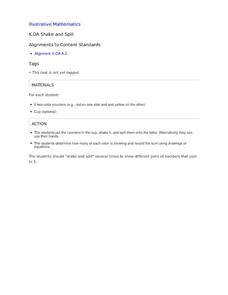


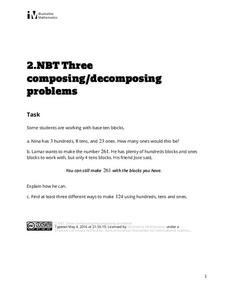
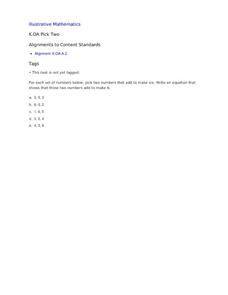
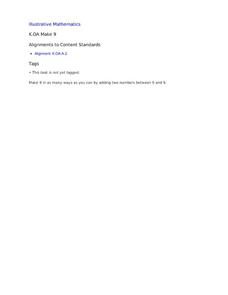
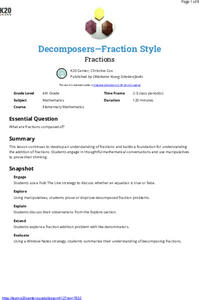


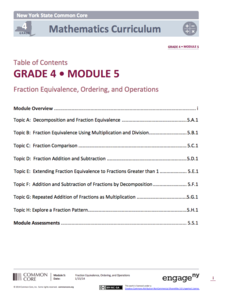


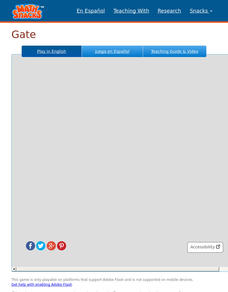



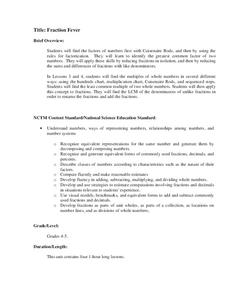

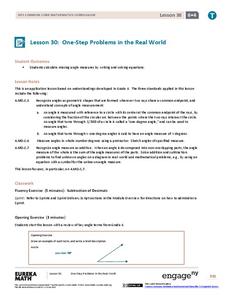


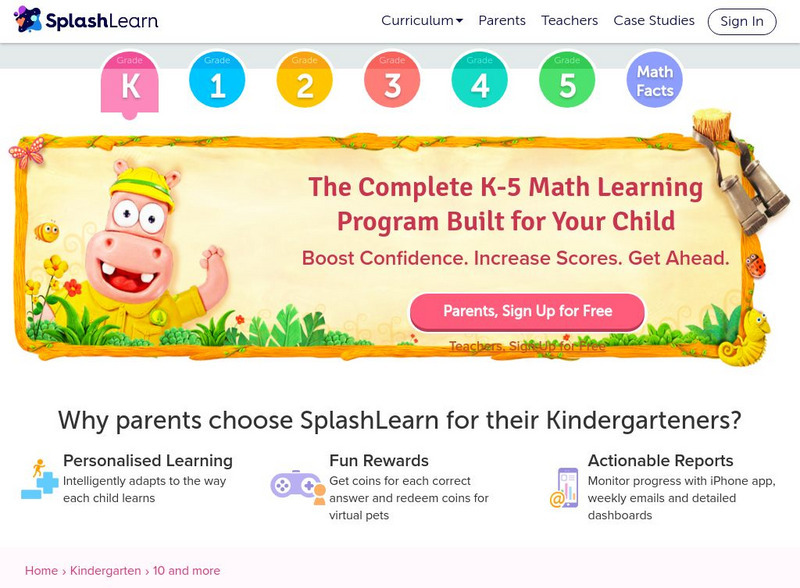
![Illustrative Mathematics: Addition and Subtraction Fluency Set of Tasks [Pdf] Lesson Plan Illustrative Mathematics: Addition and Subtraction Fluency Set of Tasks [Pdf] Lesson Plan](https://d15y2dacu3jp90.cloudfront.net/images/attachment_defaults/resource/large/FPO-knovation.png)